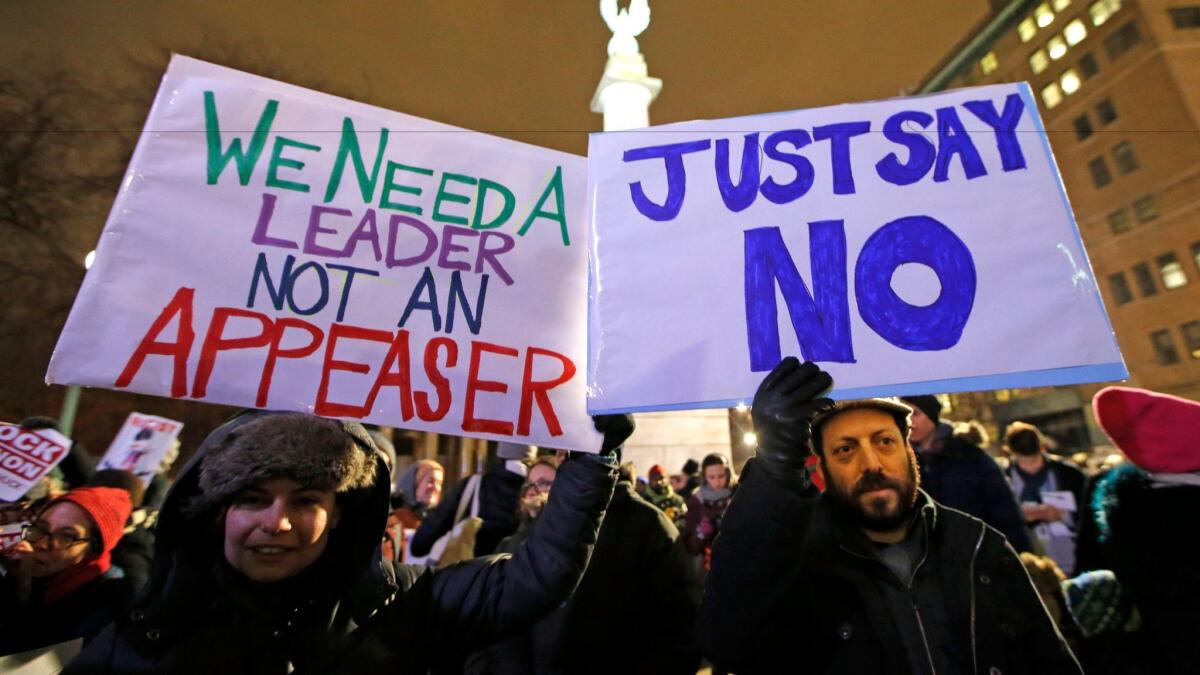Op-Ed: Democrats are copying Republican obstruction tactics. This won’t end well for the U.S.

- Share via
“No” is a word used too often by legislators. Faced with a tough vote, it’s easy to explain why you’re holding out for a different, better, competing idea. Maybe you object to a single provision. Maybe you hope that a more perfect bill will emerge after the next election. A “no” today protects you from having to take responsibility for controversial decisions tomorrow.
The problem, of course, is that our form of governance requires give and take, and solving big problems necessarily requires leaders to take political risks. The Constitution guarantees that competing interests have a role in crafting legislation. And for more than two centuries — except for the Civil War — Americans have showed that collaboration works best in the service of perfecting the union. Ronald Reagan and Tip O’Neill. Bill Clinton and Newt Gingrich. Bipartisan cooperation has sustained American peace and prosperity.
That tradition, and with it our democracy, is now at risk. We’re hardly the first to decry the rampant polarization and partisanship in Washington and across the country. But the anger and alienation that began under President George W. Bush and worsened under President Obama has reached a fever pitch early in the Trump administration, and has us both asking — though from different parties — the same question:
With every denunciation and caustic tweet from Capitol Hill and the White House, the possibility of substantive progress ... grows more distant.
How can this possibly end well for the U.S.? Obstruction worked well enough for Republican politicians under Obama; they now control the executive and legislative branches. It may work well enough for Democratic politicians under Trump; perhaps they’ll take back the executive and legislative branches. But what then? Won’t the cycle just continue?
With every denunciation and caustic tweet from Capitol Hill and the White House, the possibility of substantive progress on critical issues — like putting Americans to work, fixing our tax code or rebuilding our crumbling infrastructure — grows more distant.
Both sides seem to believe that if they stand firm, yelling “no” with sufficient fervor, the opposition will eventually back down — or lose so many seats that their opinions won’t matter. Many voters, apparently, endorse this approach, taking to the streets and storming town halls to encourage ideological purity. At a moment of fantastic possibility, when technological, scientific and medical advances offer to make life better for everyone, our political system has degenerated into dysfunction.
There is one way out of this mess. Somehow, someway, leaders need to stand up and say, “Enough.” They need to confront the angriest and most intransigent voices in their own party and say: “Your politics of division and anger is getting America nowhere. Either help find a solution or get out of the way.”
We can’t take our democracy for granted. We can’t assume there is no cost to the bitter partisanship that is turning into tribalism.
It’s both odd and heartening that, despite the bickering in Washington, the substantive challenges facing the United States are not unsolvable. Policy ideas abound that could help create jobs, balance the budget, secure retirements and achieve energy security — ideas supported by majorities of the American people in nationwide polling.
Just for example, 74% of Americans want to enforce current tax laws to close the $400-billion annual gap between legally owed taxes and taxes paid. And 83% want to modernize the electric grid. There is common ground out there, if only our leaders would look for it.
There’s even a hopeful sign that some in Congress are ready to rise above the partisan mud and start focusing on doing the people’s business. Last week saw the formation of a Problem Solvers Caucus in the House with “nearly 40 members from both sides of the aisle [who] will be fighting for common sense principles that impact all Americans.”
One of the greatest accomplishments of American democracy, is that throughout our history, the nation’s leaders have usually risen to the occasion when it was absolutely necessary. Even when it wasn’t politically expedient, courageous public servants have fought for their principles and reached across the aisle. When they realized that there were limits to what they could accomplish on their own, they sat down with their political opponents and compromised. They hardly ever loved the result in its entirety. But, for the sake of the greater good, they got themselves to “yes.”
Jon Huntsman is a former governor of Utah. Joe Lieberman is a former U.S. senator from Connecticut. They are national co-chairs of No Labels.
Follow the Opinion section on Twitter @latimesopinion and Facebook
More to Read
A cure for the common opinion
Get thought-provoking perspectives with our weekly newsletter.
You may occasionally receive promotional content from the Los Angeles Times.










